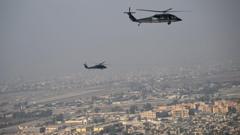A court battle looms over the deployment of 4,700 U.S. military personnel amid protests related to immigration enforcement in Los Angeles.
U.S. Military Deployment in Los Angeles Sparks Controversy

U.S. Military Deployment in Los Angeles Sparks Controversy
Tensions rise as California officials challenge President Trump's use of troops during protests.
Yesterday, downtown Los Angeles became a focal point of tension as President Trump deployed 4,000 National Guard members and 700 Marines to respond to protests surrounding recent immigration raids. This unprecedented move has raised concerns about the militarization of local law enforcement, drawing strong opposition from California officials. Governor Gavin Newsom expressed his concerns on social media, stating, “Trump is turning the U.S. military against American citizens” and calling for an emergency court order to limit military presence to safeguarding federal property.
The deployment has put President Trump in a precarious position as he defends his actions by claiming, “If we didn’t get involved, right now Los Angeles would be burning.” However, experts note that the military's involvement in domestic matters is rare and usually occurs under exceptional circumstances. Helene Cooper, a Pentagon correspondent, emphasized that while National Guard troops often assist during disasters, such deployments typically occur with the consent or request of state governors.
Legal distinctions are particularly relevant, as active-duty military forces are generally prohibited from engaging in domestic policing unless the Insurrection Act is invoked by the president. Cooper questioned the justification for invoking such drastic measures given the limited scope of the protests, which are reportedly contained to specific areas around federal buildings and not indicative of a widespread insurrection.
On-the-ground reports from journalist Jesus Jiménez highlight that the protests, although significant in their context, are constrained to a small segment of downtown Los Angeles. This situation is further compounded by the existing tensions between the federal government and California state officials, setting the stage for a potential legal showdown over the military's role in civil unrest. As events unfold, citizens and observers alike are left to navigate the implications of military presence in civilian life.
The deployment has put President Trump in a precarious position as he defends his actions by claiming, “If we didn’t get involved, right now Los Angeles would be burning.” However, experts note that the military's involvement in domestic matters is rare and usually occurs under exceptional circumstances. Helene Cooper, a Pentagon correspondent, emphasized that while National Guard troops often assist during disasters, such deployments typically occur with the consent or request of state governors.
Legal distinctions are particularly relevant, as active-duty military forces are generally prohibited from engaging in domestic policing unless the Insurrection Act is invoked by the president. Cooper questioned the justification for invoking such drastic measures given the limited scope of the protests, which are reportedly contained to specific areas around federal buildings and not indicative of a widespread insurrection.
On-the-ground reports from journalist Jesus Jiménez highlight that the protests, although significant in their context, are constrained to a small segment of downtown Los Angeles. This situation is further compounded by the existing tensions between the federal government and California state officials, setting the stage for a potential legal showdown over the military's role in civil unrest. As events unfold, citizens and observers alike are left to navigate the implications of military presence in civilian life.






















